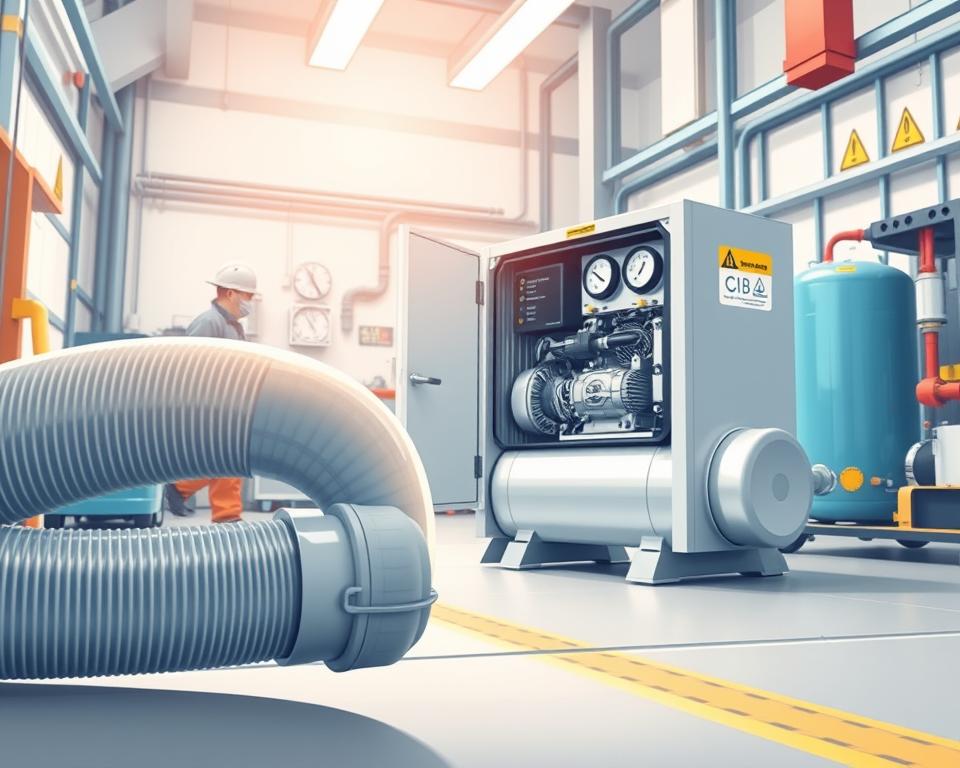Everything You Need to Know About PVC Air Compressor Piping
You might be surprised to learn that a failure in a compressed air system can unleash power on par with dynamite. Despite the hazards, numerous workshops continue installing piping systems from unsafe materials. Read on to discover why PVC air lines choices demand top-tier safety.
Despite growing interest in certain materials, OSHA strictly prohibits their use in above-ground applications. Repeated contact with compressor oil and thermal cycling makes them brittle, causing explosive failures. Those so-called safe pressure limits don’t eliminate explosion risk.
Installation Parts Supply provides safer options such as aluminum piping. Investing in proper materials avoids costly fines and keeps workplaces secure. Let’s explore how to build a safer system.

Fundamental Insights
- OSHA bans certain materials due to explosion risks.
- Temperature changes can halve pressure ratings.
- Material becomes brittle with age, upping rupture chances.
- Aluminum lines deliver a far safer option.
- Spending on correct materials avoids penalties and injuries.
Why You Shouldn’t Use PVC for Compressed Air
PVC makers caution never to employ it in high-pressure air setups. A breach in a pressurized air line unleashes explosive power, unlike water. Material selection is the linchpin of air-system safety.
- Brittleness: Sub-freezing temperatures turn materials brittle, increasing fracture risks.
- Adhesive failures: Oil contamination and heat cycles break down glue bonds.
- Misleading ratings: Most shops run above 110°F, slashing rated pressure in two.
A facility faced a $110k penalty when PVC shattered and harmed employees. Don’t forget, compression heat cuts into rated safety margins.
“Above-ground use of certain plastics for compressed air violates OSHA standards due to explosion risks.”
Steel and aluminum curve under stress instead of shattering. Plastic shrapnel from explosive failures can travel over 50 feet, embedding in walls or equipment.
Constant temperature swings in shops speed up pipe aging. Over 10 years, UV exposure and chemical interactions further compromise integrity, turning minor leaks into major hazards.
Recommended Piping Materials for Compressed Air
Aluminum air lines deliver superior safety and leak reduction. Black pipe vs. aluminum: aluminum wins with 90% fewer leaks. Lightweight, rust-proof aluminum stands up to years of service.
Modular aluminum setups save time—no threading required. Installation Parts Supply stocks ready-to-snap aluminum modules. A car plant saw a 40% drop in labor expenses after aluminum installation.
- Copper: Best for cleanrooms due to natural antimicrobial properties. Requires soldering expertise.
- Stainless Steel: In seaside shops, stainless steel won’t corrode.
- ABS/HDPE: Plastic choices like ABS or HDPE handle harsh chemicals.
“Our aluminum retrofit reduced energy waste by 15%—paying for itself in 18 months.”
Proper torque is critical. Cracks from overtightening and leaks from under-tightening are common. Follow manufacturer specs—typically 25–30 ft-lbs for aluminum joints.
Use NSF-certified materials when air quality is critical. Pick piping suited to your facility’s conditions.
How to Choose the Right Piping Material for Your Needs
Consider cost, compliance, and efficiency in your pipe decision. Switching to aluminum saved a factory $12k each year. Use this guide to select the optimal material.
| Material | Cost (per ft) | Maintenance | ROI Time |
|---|---|---|---|
| Aluminum | $8.50 | Low | 18 months |
| Black Pipe | $5.00 | High | N/A |
| Copper | $10.20 | Medium | 24 months |
Watch your operating temperatures. Aluminum handles -40°F to 200°F, while plastics crack below freezing. Use stainless steel where solvents are present.
Pro Tip: Calculate ROI using CFM loss formulas. A 10% leak in a 50 HP system wastes $3,500 yearly.
- Don’t undersize—pick pipe rated at or above your compressor’s PSI.
- Keep records of inspections and tests to satisfy OSHA.
- Request a free system audit from Installation Parts Supply.
“Our aluminum retrofit cut energy waste by 15%—paying for itself in 18 months.”
Small shops can DIY, but experts deliver guaranteed seals. Don’t forget to read the fine print on warranty lengths.
To Conclude
Smart material selection protects life and wallet. Studies show 92% of failures happen in older systems, often with dangerous results. Aluminum offers 99.8% reliability, making it a smart long-term choice.
Don’t forget:
- Never use pipes that can fragment violently.
- Choose rust-proof metals over plastics.
- Failing to comply can cost you big in fines and claims.
Upgrade now and secure your workplace. Installation Parts Supply provides same-day quotes and limited-time discounts on starter kits. Download our free maintenance template or call for emergency replacements.
Invest in secure lines now to protect your crew.
